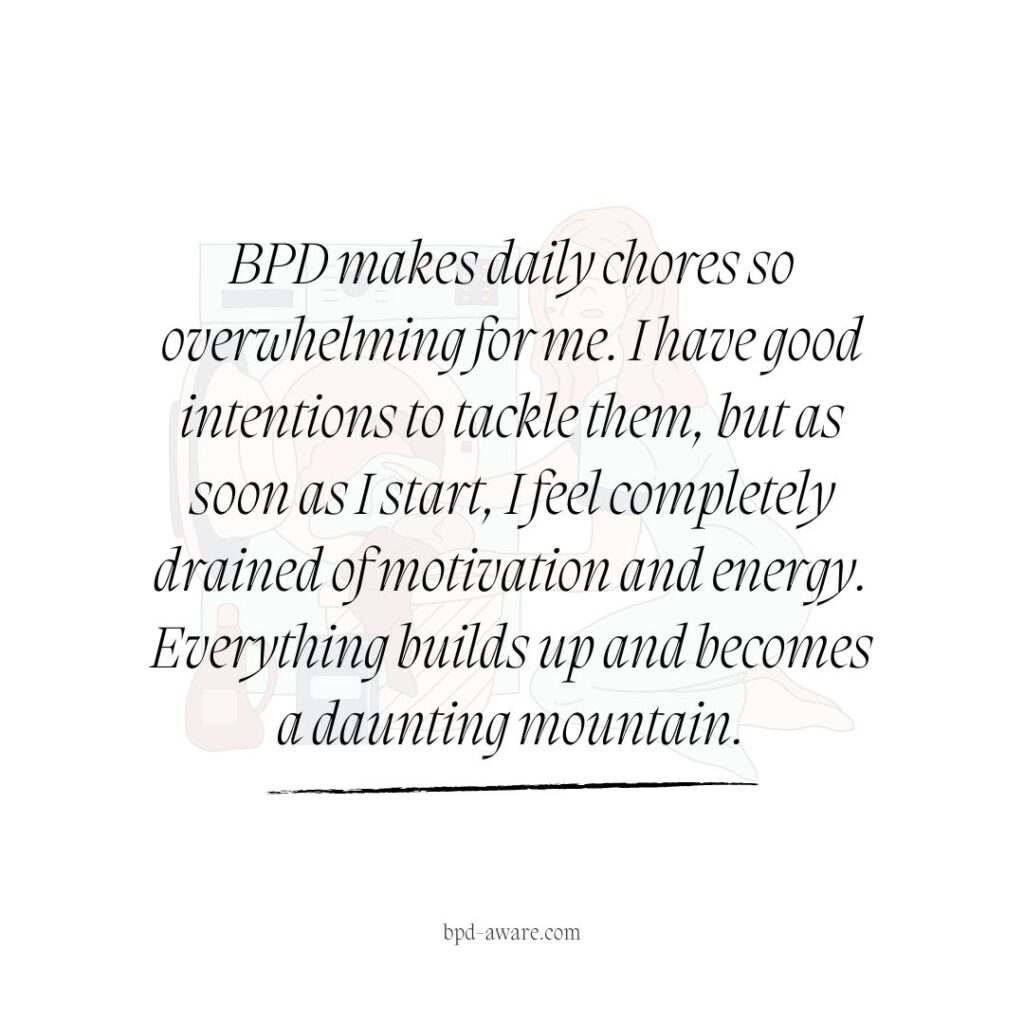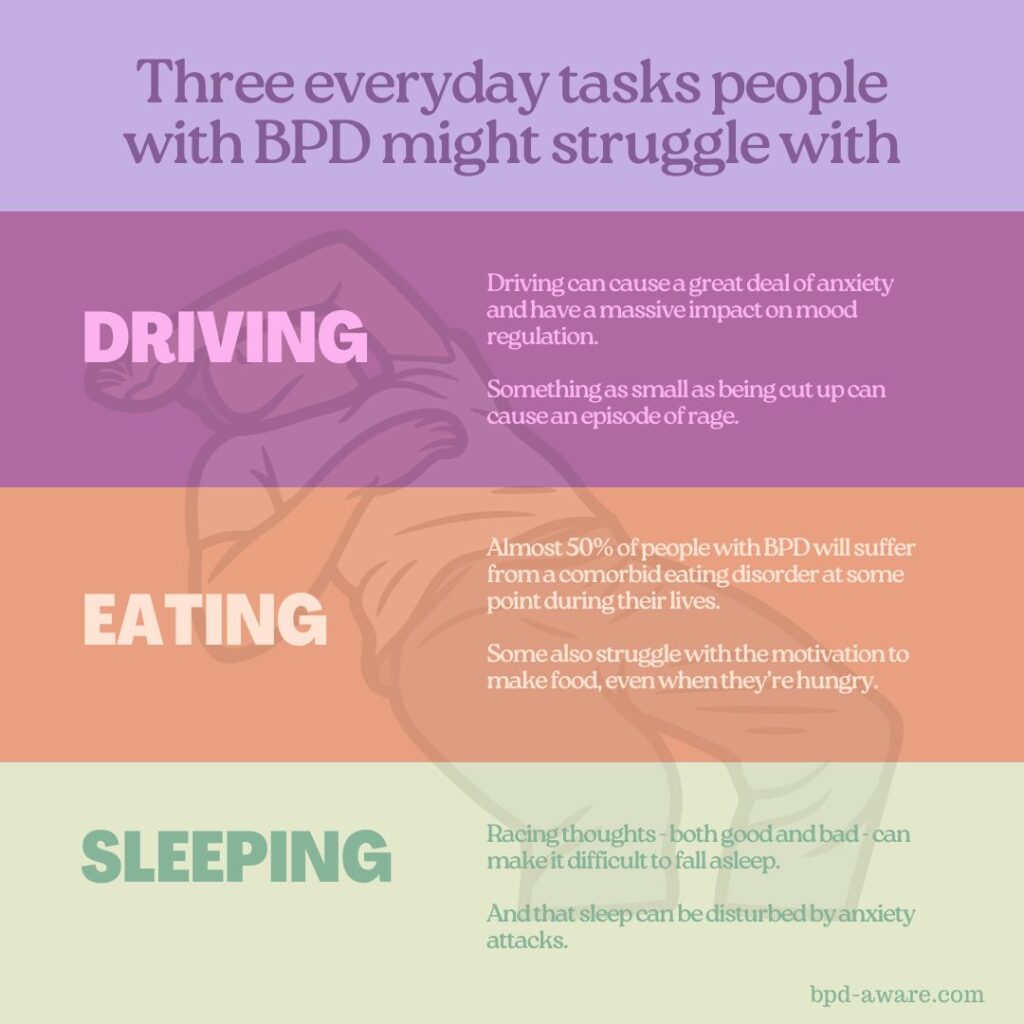When you live with Borderline Personality Disorder (BPD), your life is full of challenges. Some of them are obvious like the core symptoms of BPD, such as fear of abandonment, unstable relationships, and wild mood swings. But BPD doesn’t just affect the big things, it affects EVERYthing – even the little things that other people take for granted.
When your emotional responses are out of whack, as they so often are when you have BPD, everything can become a struggle.
We have curated a list of just some of the surprising ways Borderline Personality Disorder affects everyday life and makes it much more difficult for many of us. These might not affect everybody with BPD, but I’m sure they’ll be recognizable elements for most of us.

Getting Out of Bed
Just getting out of bed in the morning can be a struggle. I know this can be true for a lot of people anyway but living with BPD can be exhausting beyond belief. When your emotions are constantly bouncing up and down it can drain the life out of you.
Then there’s the depression and anxiety that many people with BPD cope with. The anxiety tells you that if you get out of bed and start the day then something terrible is bound to happen while the depression makes you just want to stay in bed in a state of non-existence.
And, if you had a particularly bad day before (and sometimes they ALL feel like particularly bad days), forget about it. It feels like a team of wild horses couldn’t pull us from the safety and warmth of the bed.
Driving
Most people take driving for granted but it can be a daunting experience for someone with BPD. There’s the constant anxiety that there could be an accident or the paranoia that maybe there’s another driver on the road who’s looking to crash into us.
If there is an incident, even a relatively minor one like being cut up by another driver, it can feel like a massive personal slight that sets off our rage or makes us split on the day entirely.
Opening Emails
Opening emails is another thing that can send our anxiety into overdrive. What if someone asked us to do something that we don’t think we’re capable of? What a disappointment we’re going to be to them. What if I missed someone’s email and now they’re mad at us? I couldn’t live with myself. What if someone hasn’t responded to my email? They must hate us. What if no one has responded to our email? Nobody loves us.
Talking on the Phone
Much like opening an email, talking on the phone can send our anxiety through the roof. What if we don’t know what to say? What if there’s an unexpected response? What if they think I sound stupid?
Sometimes it can feel like a massive, albeit temporary, relief when the other person doesn’t answer. But then we begin to question why they didn’t answer. Are they avoiding us? Do they hate us?
Work
Getting out of bed, driving to work, opening your emails, and making a few calls are how a lot of people start their workday. When those things can already cause major issues to your mental health, you can imagine how daunting working a regular job can be to something with Borderline Personality Disorder.
And that doesn’t account for having to deal with office politics or the general socialization that’s expected. The general pressure that comes from work can ruin our mental health – and that’s without anything particularly bad happening.
A ticking-off from the boss or a negative interaction with a colleague (even if that’s just our perception of the event) can leave us feeling wounded for days or even weeks.
It’s why many of us struggle with holding down traditional jobs. There can be solace in less traditional jobs but they often offer considerably less financial security.
Eating
Eating is pretty easy, right? Wrong! Many people with BPD also suffer from eating disorders such as anorexia, bulimia, or binge eating disorder. It’s estimated that as many as half of all people with BPD will also suffer a comorbid eating disorder at some point during their lives.
Even for those without recognized eating disorders, BPD can make eating difficult. Sometimes it’s something as lacking the motivation to cook or go out to get a meal. Other times it can be a period of rage so intense that the idea of eating makes us feel sick to our stomachs. It’s a rapid shift in self-image that makes us want to drastically change our diets on an almost daily basis.
There are several reasons why eating can be a complicated issue for someone with Borderline Personality Disorder.
Maintaining Relationships
Due to the black-and-white nature of Borderline Personality Disorder, we’re often all-in or completely out on someone. This can make relationships daunting not just for us, but for our friends, families, and partners too.
One day we might blow up a friend’s phone with twenty messages. The next day we might not be in the mood to speak with them at all.
We constantly worry about whether we’re annoying the other person or if they hate us. We might try and regulate our level of communication but that can be easier said than done.
We can also feel a great deal of shame after we’ve split on someone or feel like we’ve been a burden to them.

Studying
Studying can give us something to focus on, a welcome reprieve from thinking about our lives. When we can focus, studying can be a great source of distraction and even joy.
When we can’t focus though, trying to study can be one of the most frustrating things ever. The words look blurry and their meaning escapes us. It makes us feel stupid and like we’ll never amount to anything. At that point, studying itself seems pointless.
Cleaning
There’s rarely the motivation or energy to clean. As the house becomes dirtier, it affects our mood, self-esteem, and energy levels. This only makes it more difficult to empty the kitchen bin, wipe the counters down, or vacuum the floor. It’s a downward spiral into messiness.
Hygiene
Like cleaning, it can be hard to stick to a routine and maintain hygiene which leads to a downward spiral and worsening BPD symptoms.
As well as motivation, our impulse control isn’t always the best. It can feel a lot more rewarding to pump in another hour on our favorite game than to go and take a shower. We hate ourselves afterward for not taking the shower when we had the time.
Sleeping
When your mind is racing after a bad day, falling asleep can be a real challenge. After a good day, it can be racing with possibilities for tomorrow and be even harder to get to sleep than a bad day.
Then there’s waking up in the middle of the night with our hearts pounding for no discernible reason and being unable to get back to sleep. Looking at the clock as the restless minutes and hours add up. With poor sleep inevitably comes a bad day and a worsening of symptoms.
There are also times when all we want to do is sleep as a way to recharge, a way to avoid reality, a way to sample non-existence.
Then we have to get out of bed and do the cycle all over again…
Sources, Resources, and Further Reading
- Everyone talks about major impacts of BPD but how does it affect you in daily life?: https://www.reddit.com/r/BPD/comments/1denibt/everyone_talks_about_major_impacts_of_bpd_but_how/
- “BPD impacts my life in every way” – Gabby’s story: https://www.rethink.org/news-and-stories/blogs/2021/05/bpd-impacts-my-life-in-every-way-gabby-s-story/
- What’s It Like to Live with Borderline Personality Disorder?: https://psychcentral.com/disorders/borderline-personality-disorder/living-with
- A Day With: Borderline Personality Disorder: https://www.headspace.com/articles/borderline-personality-disorder
- A look at life through BPD-coloured glasses: Living with Borderline Personality Disorder: https://novascotia.cmha.ca/a-look-at-life-through-bpd-coloured-glasses-living-with-borderline-personality-disorder/

















I have a question. Do you think I could write about my experiences with BPD and Conversion Disorder? Conversion disorder is 23.7% made up of people with BPD, but it isn’t commonly talked about and how much it impacts daily life.
Hi, Devin!
I’d love to take a look at your work and see if it’s a good fit for the website. If you send me a message using contact form at https://bpd-aware.com/contact/ I’ll get back to you asap.
BPD is insanely difficult to deal with, but with having very supportive people in my life, it’s made it a lot easier. I am very grateful that there are resources to help others and myself understand more about this disorder.